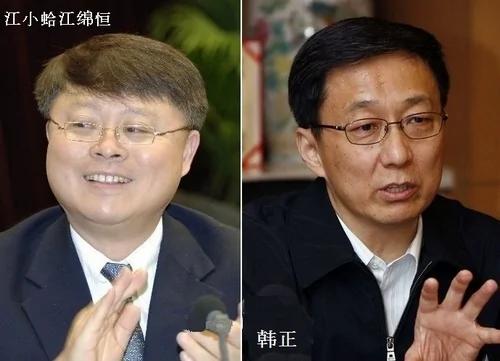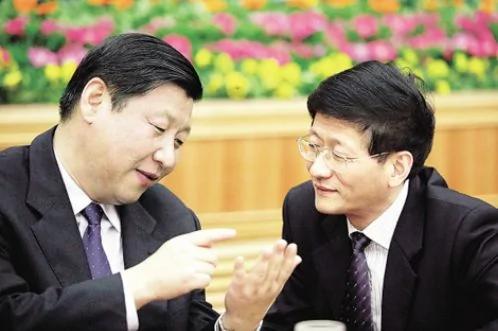| 两位新常委非常腐败10月26日文贵回来了 |
| 送交者: 2017年10月27日10:43:22 于 [世界时事论坛] 发送悄悄话 |
|
|
|
China’s Anti-Corruption Czar, Accused of Corruption, to Step Down Xi goes full Mao in codifying 'thought' BY: Bill Gertz October 25, 2017 5:00 am China's anti-corruption czar who is also the Communist Party official in charge of all financial policies will step down this week from his position on the powerful Standing Committee of the Politburo. The official, Wang Qishan, for the past five years directed a vast anti-corruption campaign that struck fear into political and military leaders and ensnared scores of senior officials and thousands of lower-level Party cadres linked to corruption that observers says is an endemic feature of the current system. The ouster of large numbers of Party officials also is widely viewed as a subterfuge for the consolidation of power by current supreme leader Xi Jinping—whose personal ideology was elevated to the status of a guiding Party "thought" this week during the major Communist Party congress in Beijing. Ironically, Wang was exposed earlier this year as engaging in illicit financial practices by exiled dissident Chinese billionaire Guo Wengui, who regards the expected retirement of Wang as a victory for his campaign as a whistleblower of high-level Chinese corruption. "The downfall of Wang Qishan is definitely a victory for a grassroots campaign led by many Chinese anti-kleptocracy activists, including myself, which is unprecedented in the recent history of China," Guo told the Washington Free Beacon. "Dismantling this time bomb is good news for the West, because Wang can no longer use the money he stole from the Chinese people to do harm in democratic countries," he said in a statement. Guo said the replacement of Wang does not mean the end of the "anti-kleptocracy campaign" he is leading. "On the contrary everything is just beginning," he said. The leadership changes in China come two weeks before President Donald Trump will travel to China for meetings with Xi. "We strongly urge the president to cancel his trip to China," said Yang Jianli, a U.S.-based democracy activist. "It is clear that Xi wants to become the dictator of China and is setting the stage for the Communist regime to rule the world in the next 100 years. President Trump's China visit will be seen as an endorsement of Xi's plan." The corruption allegations against Wang resulted in his temporarily dropping out of public view for several months before he reemerged last month in the run up to the Party congress. Wang, in addition to directing the Party's powerful inspection directorate, is the Standing Committee official in charge of all of China's financial policies, a position that makes him one of the three or four most powerful leaders in China. China's 2017 gross domestic product is estimated to be $11.8 trillion. The new line up for the seven-member Standing Committee, the collective dictatorship headed by Xi that rules China, will be made public Wednesday during the major five-year conference. A list of the 204 members of the Central Committee, from which Standing Committee members are selected, did not include Wang. Communist Party sources reported in multiple Chinese and Asian news outlets this week revealed that Wang and four other Standing Committee members will be replaced. The public reason for the retirements is that the officials have reached the unofficial retirement age of 68. Wang is 69. A more likely reason for Wang's expected retirement, according to observers, is that he had become a political liability for Xi within the Party's secretive political and military leadership. Guo, the New York-based dissident, disclosed to the Free Beacon in July that Wang was engaged in sub rosa financial activities in the United States and China. "Wang Qishan took over the reins from [former Premier] Zhu Rongji, and now Wang is in control of the Chinese finance," Guo said. "The amount of financial power these guys have accumulated for themselves is mind boggling," he said. "It is not something that can even be comprehended by the normal Americans. What they want to do is use that financial power and leverage to control the political system." Guo said that Wang owns 111 properties in the United States that were purchased starting in the 1980s for around $30 million and today are valued at around $2 billion. Wang also launched Hainan Airlines, placing two of his relatives in charge. The company has grown into a major multibillion-dollar conglomerate called HNA. Guo, who has applied for political asylum in the United States, said he came under fire from Chinese authorities that have accused him of various crimes after a senior Chinese security official uncovered evidence of corruption by Wang. The official, Ma Jian, was imprisoned on trumped up corruption charges, he said. Xi, meanwhile, achieved a new level of power within the Party-ruled system in China this week when his personal ideology was enshrined within the Chinese constitution. His ideology is dubbed "Xi Jinping Thought on Socialism with Chinese Characteristics in a New Era." Xi thought advocates a Chinese supremacist worldview that calls for China to become the dominant world power. Because of his backing of orthodox Chinese Communist ideology, Xi has been dubbed "Chairman Xi" and "Uncle Xi." His recently published book, "The Governance of China," has been compared to Mao's "Quotations from Chairman Mao Zedong," the ideological manifesto used by Communist zealots during the chaos of the Cultural Revolution in the 1960s and 1970s. Xi also has taken up residence in Mao's home inside the walled-off Beijing leadership compound known as Zhongnanhai. Until Xi moved in, the Mao residence had been a museum. Only two other Party leaders since the Communists seized power in 1949 have had their Communist-derived ideologies codified: Mao Zedong and reform-era pioneer Deng Xiaoping. Xi's political theory joins Marxism-Leninism, Mao Zedong Thought, Deng Xiaoping Theory, the Theory of Three Represents, and the Scientific Outlook on Development as ruling Chinese ideologies. Two predecessors to Xi—Jiang Zemin and Hu Jintao—did not achieve the same ideological milestone. Without codification of their views in the constitution, Chinese leaders can be purged by successor leaders, a common practice in the past for Chinese emperors in ancient times. Xi, who turned 64 in June, will reach retirement age during his next five-year term as Party secretary and statements identifying him as the "core leader" suggest he may remain the Chinese supreme leader beyond 2022. Willy Wo Lap Lam, a veteran China watcher with the Chinese University of Hong Kong, said the congress elevated Xi to a level of power not seen since Mao. "This will help Xi justify his ambition of staying No. 1 for 15 if not 20 years—despite the well-observed convention that a party chief stays only for two terms of five years each," he said. Xi’s ideas are not new, Lam says. "It is a rehash of the Chinese Dream mantra: a super-nationalistic pledge that China will become a superpower by or before the year 2050," he told the Free Beacon. On Wang Qishan, Lam said Xi reluctantly let him go because Wang made too many enemies, mainly by using anti-graft operations as a political tool to take out or intimidate Xi's political foes. "Wang is extremely unpopular with cadres in the party, government and army," he said. "His retirement could be seen as an indirect concession by Xi to the legions of party officials who are opposed to Wang's tactics." Retired Navy Capt. Jim Fanell, a former Pacific Fleet intelligence director, said Wang's removal most likely was timed to the undocumented age rule but could have hidden motives. "It is worth considering that President Xi Jinping may have removed Wang out of concern for what information exiled Chinese billionaire Guo Wengui could expose about rumors of corruption by Wang," Fanell said "Regardless of the ultimate truth of President Xi's decision, given Guo's previous access and knowledge of the inner circles of power with the Communist Party of China, one would hope that he has been debriefed by the U.S. intelligence community before President Trump's inaugural trip to China," he added. Guo, the dissident businessman, said the lineup of officials on the new Standing Committee is the result of political compromise and balance among the Party's vested interests.
Two new Standing Committee members who maneuvered their way to the top political body "are very corrupt," Guo said, without identifying the officials. " 两位新常委非常腐败 ” ( 郭宝胜点出一位 韩正 (1954年4月 -), 王沪宁? 赵岩: 韩正 —— 百分之一万的大坏蛋。从来不把习近平 放在眼里,也不把人民放在眼里。) "I am determined to expose them until China is turning away from kleptocracy and moving towards rule of law and democracy," he said. Guo said the aftermath of the Party congress offers the west both an opportunity and crisis. "I hope the democracies understand the tremendous significance of it and take necessary measures to respond to it, or darkness will fall over the free world," he said. The South China Morning Post reported that Wang's replacement on the Standing Committee and successor as anti-corruption czar is Zhao Leji, currently a Party functionary. The new financial czar replacing Wang Qishan is expected to be Wang Yang, currently one of four vice premiers. Wang Yang was Party leader in southern Chongqing from 2005 to 2007, a province considered riddled with corruption. The Hong Kong newspaper said Wang, based on his closeness to Xi, likely will stay on in a lesser role, perhaps as part of the new national security council. Wang's tenure on the Standing Committee was closely watched by U.S. intelligence agencies as analysts sought to determine if Xi will abide by or ignore retirement guidelines in his next five-year term. One Party source was quoted as saying age limits and seniority "still matter in deciding" candidates for senior positions, and are important "to forge consensus [among different factions] and maintain stability." Another source revealed that Wang favored retirement and wanted to "bow out on a high note" a comment that suggests he may be facing political trouble. Wang had discussed remaining on the Standing Committee with colleagues and decided to accept a more low-key role off the committee. Wang met with former Trump strategist Steve Bannon last month in what many regarded as a bid to bolster his standing among senior Chinese leaders. 陈小平 @xchen15 Follow 郭文贵: 王岐山走人肯定是反盗国贼积极分子领导的草民运动大胜,中国历史无先例。拆除王这个定时炸弹对西方是利好。王无法再用偷来的钱危害西方。但下台不是反盗国贼运动结束,一切都是刚刚开始。新常委是各种利益的平衡。未点名的两位常委非常腐败。 2017年10月26日 文贵直播 十九大后爆料计划 “ 造谣说文贵没钱了? 我现在就可以拿出60亿美元现金,摆在纽约大街上, 还可以拿出更多。” " 习做出承诺,不动他们两个,不查岐山、建柱,会意思意思,把事儿查清,不会伤及本人,有些意思就行了;说到力军,会查,会调整工作,不会抓 ...... 最后一分钟,把王沪宁弄上常委来,就不让陈敏尔上来,这是 最后的妥协。”
“ 王岐山从未放弃过,他想当总理,继续当常委; 孟建柱从未放弃过,他要当国家副主席,要进中央 国安委 ...... ” “ 我明确地告诉大家,七个新常委里边,有两个是大盗国贼! 他们没有王岐山的阴,没有孟建柱的狠,或者表面上,没有他们那样嚣张和巨大的金融网络、司法网络和那个搞各种女人,干那些坏事情。但是,他们是更加地危险: 第一,他们获得了习主席的绝对信任 ...... ” " 新常委里,就有一个司马懿。我非常清楚,他一旦出手,习主席将有巨大的人身危险,国家将大乱。大乱之后,他有可能当国家的最高领导,或 ...... " “ 这个人,是孟建柱、王岐山处心积虑地栽培,要让他进常委。这个人,对党的危害,对习主席的危害,对国家的危害, 我可以说,无法想象!”“ 这两个新常委,还有军队的三个领导,我是一定要爆的。这军队的三个人 ...... 投机取巧,溜须拍马,我非常清楚。” Wow, “ 接下来,我们要配合各国司法部门,没收盗国贼海外藏匿的巨额资产,拿出一半来,放在世界各国挺郭会里,作为建立民主法治新中国的资金。” " 舒晓琴 (1956年9月 -),当了十天的中央委员 ...... 这不是丢死人了吗?” “ ...... 习主席明确地批示,给王岐山和孟建柱,从现在起,不允许动郭文贵家人和岳庆芝家人任何一个人 ...... ” “ 文贵啊,可以考虑给你一个全国工商联副主席,或政协副主席,只要你不再爆料了。” |
|
|
|
|
 |
 |
| 实用资讯 | |
|
|
| 一周点击热帖 | 更多>> |
|
|
|
| 一周回复热帖 |
|
|
| 历史上的今天:回复热帖 |
| 2016: | 朝鲜、中国空姐对比,一比吓一跳。 zt | |
| 2016: | 中国的不幸,在于有一个出卖国家利益的 | |
| 2015: | 不争气的子孙:老祖宗保护不了你们 z | |
| 2015: | 从习包子“说书”,看党国有多蠢 z | |
| 2014: | 中共与神较量已达到登峰造极 中共开 | |
| 2014: | 双层自行车全省行,曝光被惠州大老虎群 | |
| 2013: | “真共产党人罪”与新生中国共产党 | |
| 2013: | 安玛:陈永洲三天“认罪”是薄冤案的续集 | |
| 2012: | CNN在2008年表演过一次,314汉人杀藏人 | |
| 2012: | 温家宝/和坤跌倒,胡锦涛/嘉靖吃饱 | |
|
|






